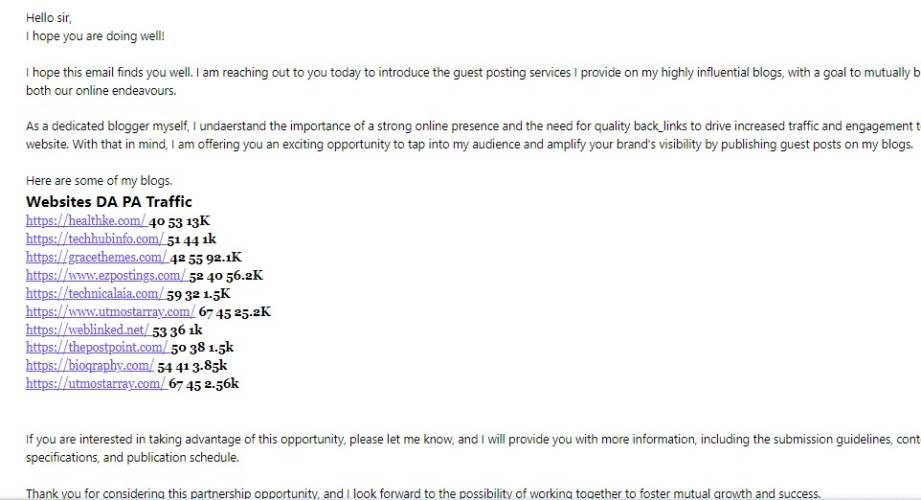- Indian-Origin Spammers Utilising Fake (Alias) Identities and Free Email Providers
According to reports. the emails are being sent through free email providers such as Gmail, Hotmail, and Outlook, are purportedly coming from individuals using fake western English names.
The spam emails typically follow a similar format, with a generic introduction followed by a proposition for SEO services aimed at boosting the recipient’s website visibility on search engines like Google. An example of these emails, provided by recipients, reads:

Despite the seemingly personalised touch with Western names like “Trisha Patel,” recipients have flagged these emails as spam due to their unsolicited nature and repetitive content.
Some of these spam emails are typically crafted to sound like they were written by a person with expertise in the SEO industry and come across as knowledgeable, yet the sender hasn’t taken the time to review your website in detail.
They also capitalise on the common lack of SEO knowledge among small business owners, instilling fear that they are making mistakes, their websites are not ranking well and they need to be corrected.
Often, these nuisance emails also originate from lead generation companies or independent freelancers in India seeking business opportunities, like those selling bulk leads to possibly dubious SEO enterprises.
Alternatively, they might also harbor phishing schemes or malware, aiming to seize control of your website and gather personal or financial data.
These entities employ automated methods to dispatch mass emails to numerous businesses, devoid of any scrutiny of your specific business or website.
Regardless of the content’s intent, it’s improbable that your business will derive any advantage from the services proposed.
Dodgy SEO operators have also been noted in the past to seek access to websites so they can hide hyperlinks for their own clients to turn over a buck. (SEO Scams)
In one case a service based in India providing WordPress breck fix solutions was found hiding hyperlinks in their customers websites in order to digitally promote their own site in the search engine after providing the solution.
SEO Spam Emails Raises Concerns
The prevalence of these spam emails has raised concerns among website owners regarding the security of their contact information and the potential exploitation of their online presence.
Additionally, the use of fake identities adds another layer of complexity to identifying and curtailing the activities of these spammers.
Experts in cybersecurity emphasise the importance of remaining vigilant against such spam campaigns and urge website owners to exercise caution when responding to unsolicited emails offering SEO services or any other digital marketing solutions.
Verifying the legitimacy of service providers and conducting thorough research before engaging with them is advised to mitigate the risk of falling victim to fraudulent schemes.
Investigations reveal that many of these spammers are actually resellers attempting to profit from reselling SEO services for a commission, while others are marketing services based in India utilising free email accounts to market their own offerings without exposing their real email addresses to spam activities.
While the emails profess to provide top-tier SEO solutions that guarantee first-page rankings on Google, closer scrutiny reveals a dubious reality: these services often fail to deliver on their promises, leaving recipients disillusioned and skeptical.
Experts also caution that the promises made by these spammers raise significant red flags. If these services are truly capable of achieving first-page rankings on Google, why do they resort to spamming tactics instead of relying on organic website traffic and legitimate marketing strategies to promote their own services?
This glaring discrepancy underscores the deceptive nature of these spam campaigns and prompts website owners to question the legitimacy of such offers.
Further investigation into the identities behind these spam emails unveils a complex web of deceit. Many of the purported digital marketing services are merely middlemen, reselling SEO services offered by other providers for a commission.
By leveraging the anonymity afforded by free email accounts and fake identities, these resellers attempt to capitalise on unsuspecting website owners.
Simultaneously, Indian-based marketing services exploit free email accounts to promote their offerings without implicating their genuine email addresses in spam activities. The tactic allows them to circumvent potential repercussions while still reaching a global audience with their marketing services.
Tech Business News and its associated media websites have diligently monitored the statistics surrounding these emails, having received a total of 1,204 unsolicited emails promoting dodgy SEO services in 2023 alone.
CEO, Matthew Giannelis, strongly advises disregarding any digital marketing company or service that promises first-page rankings on Google, stating unequivocally that no company in the world can provide such a guarantee.
Guest post spam emails also inundating modern-day inboxes
These emails take the guise of guest posting services, where recipients are inundated with random emails offering lists of guest posts for purchase.
These spam emails are frequently dispatched by freelance resellers, commonly from regions like India or Pakistan. The lists are often compiled from various online services, including the black hat link buying and selling platform iCopify.com.

A recent comprehensive study conducted over the span of a year in 2023 sheds light on the escalating issue, revealing that out of 1000 “Guest Post Reseller Spam Emails” analysed, a staggering 66% originated from India, while 31% were traced back to Pakistan.
India’s SEO Spam Problem – Becomes Epidemic
India first topped the Dirty Dozen report when it overtook the US as the world’s top spam-relaying country in Q1 2012. At the time, India contributed 9.3 percent of all spam sent worldwide, while the US was at 8.3 percent.
In 2023 the Indian government announced it would make plans to introduce provisions in the Digital India Bill that would hold companies accountable for unsolicited commercial email and other electronic messages.
The move is aiming to curb spam, which currently accounts for nearly half of all global emails in 2024 and will likely include penalties for violations.
The penalties may also extend to communications sent over WhatsApp. The government is currently studying international laws but acknowledges that enforcement will be crucial in deterring spam.
“The issue of unsolicited messages has not been addressed by the IT Act. The new Digital India Bill will aim to address the issue,” a government official said, asking not to be named. The provisions will likely include penalties for violation, the person added.
As website owners grapple with the deluge of spam emails flooding their inboxes, industry experts emphasise the importance of exercising caution and skepticism when engaging with unsolicited offers for SEO services or digital marketing solutions.







